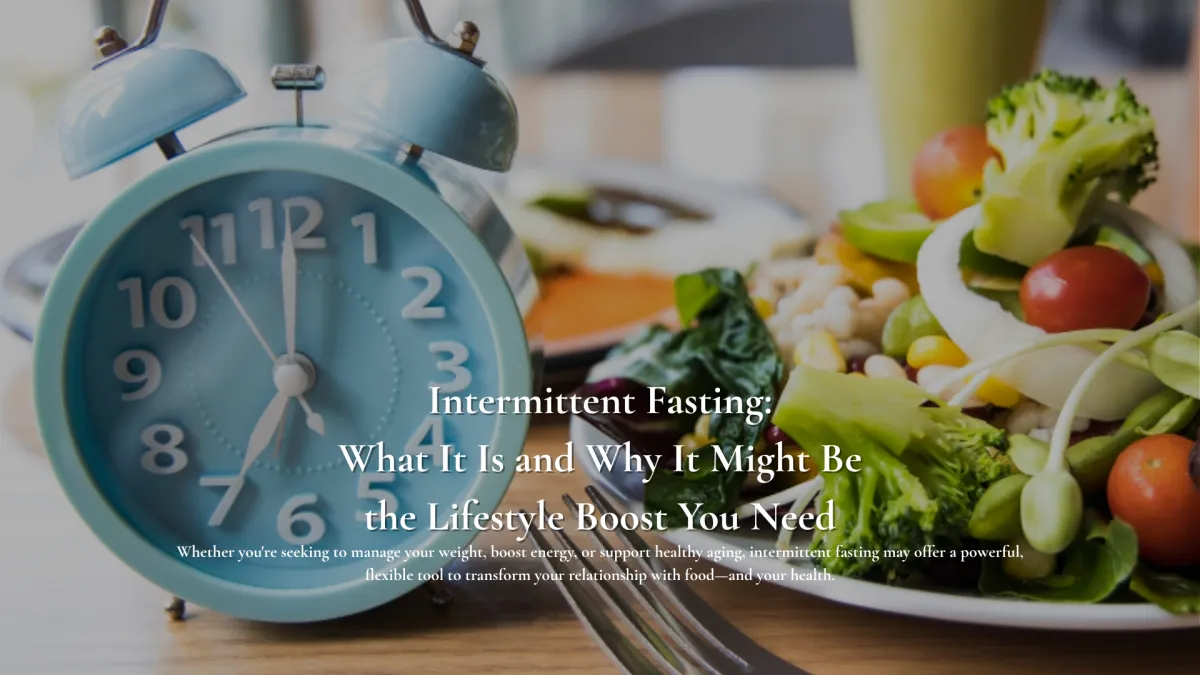
Intermittent Fasting: What It Is and Why It Might Be the Lifestyle Boost You Need
In a world where wellness trends come and go, intermittent fasting (IF) has emerged not as a fad, but as a time-tested approach to eating that aligns with how our bodies naturally function. Whether you're seeking to manage your weight, boost energy, or support healthy aging, intermittent fasting may offer a powerful, flexible tool to transform your relationship with food—and your health.
What Is Intermittent Fasting?
Unlike traditional diets that focus on what you eat, intermittent fasting focuses on when you eat.
Intermittent fasting is an eating pattern that cycles between periods of eating and fasting. It doesn’t dictate specific foods but the timing of your meals. The goal is to give your body extended breaks from food intake to allow for metabolic rest, repair, and optimization.
Common IF methods include:
16:8 Method: Fast for 16 hours and eat during an 8-hour window (e.g., 12 PM to 8 PM).
5:2 Method: Eat normally for five days a week, but limit calorie intake (around 500–600 calories) on the other two days.
Alternate-Day Fasting: Fast every other day, either completely or with reduced calorie intake.
Eat-Stop-Eat: One or two non-consecutive 24-hour fasts per week.
Each approach offers varying levels of flexibility depending on your goals and lifestyle.
Top Benefits of Intermittent Fasting
Intermittent fasting isn't just about skipping breakfast—it’s a strategic approach to improving metabolic function and long-term health. Here are some of the most well-researched benefits:
1. Supports Healthy Weight Management
IF helps reduce overall calorie intake while boosting metabolism. During fasting, your insulin levels drop, and your body taps into fat stores for energy, making it easier to burn fat.
✔ Encourages fat loss while preserving lean muscle
✔ Reduces mindless snacking and late-night cravings
2. Improves Blood Sugar and Insulin Sensitivity
Studies show intermittent fasting can lower blood sugar levels and improve insulin sensitivity, which is particularly beneficial for those at risk of type 2 diabetes or metabolic syndrome.
✔ Supports stable energy levels
✔ May reduce inflammation linked to insulin resistance
3. Promotes Cellular Repair and Longevity
Fasting activates a cellular process called autophagy—a natural detox where cells remove damaged components and regenerate.
✔ Encourages cellular rejuvenation
✔ May contribute to healthy aging and brain function
4. Enhances Mental Clarity and Focus
Many IF practitioners report better concentration and mental energy during fasting windows. This is partly due to stabilized blood sugar and increased production of brain-derived neurotrophic factor (BDNF), a protein that supports brain health.
✔ Improved cognitive performance
✔ Reduced brain fog and fatigue
5. Simplifies Your Daily Routine
With fewer meals to plan and prepare, intermittent fasting can simplify your life, especially for busy professionals juggling packed schedules.
✔ Fewer decisions around food
✔ More time for productivity and self-care
Is Intermittent Fasting Right for You?
While IF offers many benefits, it’s not ideal for everyone. If you’re pregnant, breastfeeding, have a history of eating disorders, or take certain medications, speak with a healthcare provider before starting any fasting routine.
Start slowly, listen to your body, and choose a method that complements your lifestyle. Intermittent fasting is not about restriction—it's about intentional nourishment and balance.
Final Thoughts
At its core, intermittent fasting is a sustainable wellness strategy that works with your body’s natural rhythms. It’s less about deprivation and more about optimization—of energy, metabolism, and overall health. Whether you’re on a journey to feel more energized, manage your weight, or support graceful aging, intermittent fasting can be a powerful part of your lifestyle toolkit.
Ready to take control of your health, one mindful hour at a time? Let’s explore how intermittent fasting can be tailored to your unique life and goals.
